1996 年 1 月英语六级真题及答案
Part I Listening comprehension (20 minutes)
Section A
Directions: Inthissection,youwillhear10shortconversations.Attheendofeach
conversation, a question will be asked about what was said. Both the
conversationandthequestionwillbespokenonlyonce.Aftereachquestion
therewillbeapause.Duringthepause,youmustreadthefourchoicesmarked
A), B), C) and D), and decide which is the best answer. Then mark the
corresponding letter on the Answer Sheet with a single line through the
centre.
Example:
You will hear:
You will read:
A) 2 hours.
B) 3 hours.
C) 4 hours.
D) 5 hours.
From the conversation we know that the two were talking about some work they will
start at 9 o’clock in the morning and have to finish at 2 in the afternoon. Therefore,
D) “5 hours” is the correct answer. You should choose [D] on the Answer Sheet and
mark it with a single line through the center.
Sample Answer [A] [B] [C] [D]
1.
A) The flight has been canceled.
B) The plane is late.
C) The plane is on time.
D) The tickets for this flight have been sold out.
2.
A) He is not to blame.
B) It was his fault.
C) He will accept all responsibility.
D) He will be more careful next time.
3.
A) The man is a forgetful person.
B) The typewriter is not new.
C) The man can have the typewriter later.
�
D) The man misunderstood her.
4.
A) There will be heavy fog in all areas.
B) There will be heavy rain by midnight.
C) There will be heavy fog in the east.
D) There will be fog in all areas by midnight.
5.
A) She’s scornful.
B) She’s angry.
C) She’s sympathetic.
D) She’s worried.
6.
A) He likes the job of a dish-washer because it pays well.
B) He thinks it’s important to have a good job from the beginning.
C) He hates to be a dish-washer because it’s boring.
D) He would work as a dish-washer in summer if he has to.
7.
A) She must learn to understand John’s humor better.
B) She enjoys John’s humor a great deal.
C) She doesn’t appreciate John’s humor.
D) She thinks John is not funny enough.
8.
A) Joan may have taken a wrong train.
B) Joan will miss the next conference.
C) Joan won’t come to the conference.
D) Joan may be late for the opening speech.
9.
A) She has been dismissed for her poor performance.
B) She has been fired by the company.
C) She has been granted leave for one month.
D) She has been offered a new job.
10. A) It will last for two weeks.
B) It has come to a halt.
C) It will end before long.
D) It will probably continue.
Section B
Directions: In this section, you will hear 3 short passages. At the end of passage,
�
you will hear some questions. Both the passage and the questions will be
spokenonlyonce.Afteryouhearquestion,youmustchoosethebestanswer
fromthefourchoicesmarkedA),B),C)andD).Thenmarkthecorresponding
letter on the Answer Sheet with a single line through the centre.
Question 11 to 13 are based on the passage you have just heard.
Passage one
11. A) She was an office worker.
B) She was a physician.
C) She was a cleaner.
D) She was a social worker.
12. A) Because she could not sleep well at night.
B) Because she hoped to earn more money.
C) Because she could not find a daytime job.
D) Because she needed a change and a lighter job.
13. A) She works six nights every fortnight.
B) She does not take part in social activities in her working days.
C) She has been a night nurse in a hospital for about 25 years.
D) She is not satisfied with her present job.
Questions 14 to 17 are based on the passage you have just heard.
Passage Two
14. A) A small town in Britain.
B) A new type of jail.
C) A labour camp.
D) A big gymnasium in Scotland.
15. A) Women criminals in Scotland.
B) Criminals who are given long sentences.
C) Criminals who are given short sentences.
D) Criminals in Scotland.
16. A) The reward the prisoners get for their work.
B) The comfortable accommodation.
C) The way the prisoners are treated.
�
D) The officers’ sympathy for the prisoners.
17. A) To give the prisoners more freedom.
B) To help the prisoners keep their self-respect.
C) To help the prisoners develop the sense of independence.
D) To turn the prisoners into skilled workers.
Questions 18 to 20 are based on the passage you have just heard.
Passage Three
18. A) On an airplane.
B) Near the terminal building.
C) In a coach to the city.
D) In the waiting room.
19. A) Near the airport hotel.
B) At the travelers’ information desk.
C) Outside the Customs Hall.
D) In the center of the city.
20. A) The departure tax they have to pay on their next international flight.
B) The distance they have to travel from the airport to the city center.
C) The prices the major hotels charge.
D) The place where taxis are waiting to be hired.
Part II Reading Comprehension (35 minutes)
Directions: There are 4 reading passages in this part. Each passage is following by
some questions or unfinished statements-For each of them there are four
choicesmarkedA),B),C)andD).Youshoulddecideonthebestchoiceand
marktheandmarkthecorrespondingletterontheAnswerSheetwithasingle
line through the centre.
Questions 21 to 25 are based on the following passage:
Material culture refers to the touchable, material “things”—physical objects
that can be seen, held, felt, used—that a culture produces. Examining a culture’s
tools and technology can tell us about the group’s history and way of life. Similarly,
research into the material culture of music can help us to understand the music-culture.
The most vivid body of “things” in it, of course, are musical instruments. We cannot
hear for ourselves the actual sound of any musical performance before the 1870s when
the phonograph was invented, so we rely on instruments for important information about
�
music-cultures it the remote past and their development. Here we have two kinds of
evidence: instruments well preserved and instruments pictures in art. Through the study
of instruments, as well preserved Paintings, written documents, and so on, we can
explore the movement of music from the Neat East to China over a thousand years ago,
or we can outline the spread of Near eastern influence to Europe that results in the
development of most of the instruments on the symphony orchestra.
Sheet music or printed music, too is material culture. Scholars once defined folk
music-cultures as those in with people learn and sing music by ear rather than from
print, but research show mutual influence among oral and written sources during the
past few centuries in Europe, Britain, and America, printed versions limit variety
because they tend to standardize any song, yet they stimulate people to create new and
different songs. Besides, the ability to read music notation has a far-reaching effect
on musicians and, when it becomes widespread, on the music-culture as a whole.
One more important part of music’s material culture should be singled out the
influence of the electronic media-radio, record player, tape recorder, television, and
videocassette, with the future promising talking and singing computers and other
developments. This all part of the “information revolution,” a twentieth century
phenomenon as important as the industrial revolution was in the nineteenth. These
electronic media are not just limited to modem nations; they have affected
music-cultures all over the globe.
21. Research into the material culture of a nation’s of great importance ________.
A) it helps produce new cultural tools and technology
B) it can reflect the development of the nation
C) it helps understand the nation’s Fast and present
D) it can demonstrate the nation’s civilization
22. It can be learned from this passage that ________.
A) the existence of the symphony was attributed to the spread of Near Eastern and
Chinese music
B) Near Eastern music had influence on the of the instruments in the symphony
orchestra
C) the development of the symphony shows the mutual influence of Eastern and Western
music
D) the musical instruments in the symphony basis of Near Eastern music
23. According to the author, music notation is important because ________.
A) it has a great effect on the music-culture as more and more people are able
to read it
B) it tends to standard folk sings when it is used by folk musicians
C) it is the printed version of standardized folk music
�
D) it encourages people to popularize printed versions of songs
24. It can be concluded from the passage that the introduction of electronic media into
the world of music ________.
A) has brought about an information revolution
B) has speeded up the arrival of a new generation of computers
C) has given rise to new forms of music culture
D) has given to the transformation of traditional musical instruments
25. Which of the following best summarized the main idea of the passage?
A) Musical instruments developed through the years will sooner later be replaced
by computers.
B) Music cannot be passed on to future generation unless it is recorded.
C) Folk songs cannot spread far unless they are printed on music sheets.
D) The development of music culture is highly dependent or its material aspect.
Questions 26 to 30 are based on the following passage.
The question of whether war is inevitable is one which has concerned many of the
world’s great writers. Before considering this question, it will useful to introduce
some related concepts. Conflict, defined as opposition among social entities directed
against one another is distinguished from competition, defined as opposition among
social entities independently striving for some thing which is in inadequate supply.
Competitors may not be aware of one another, while the parties to a conflict are.
Conflict and vice of one another.
Opposition is thus contrasted with cooperation, the process by which social
entities function in the service of one another. These definitions are necessary because
it is important to emphasize that competition between individuals or groups is
inevitable in a world of limited resources, but conflict is not. Conflict, nevertheless,
is very likely to occur, and is probably an essential and desirable element of human
societies.
Many authors have argued for the inevitability of war from the premise that in the
struggle for existence among animal species, only the fittest survive. In general,
however this struggle in nature’s competition, not conflict. Social animals, such as
monkeys and cattle, fight to win or maintain leadership of the group. The struggle for
existence occurs not in such fights but in the competition for limited feeding areas
and for the occupancy of areas free from meet-eating animals. Those who fail in
competition starve to death or become victims to other species. This struggle for
existence does not resemble human war, but rather the competition of individuals for
jobs, markets, and materials. The essence of the struggle is the competition for the
necessities of life that are insufficient to satisfy all.
Among nations there is competition in developing resources trades, skills, and a
satisfactory way of life. The successful nations grow and prosper; the unsuccessful
�
decline. While it is true that this competition may induce efforts to expand territory
at the expense of others, and thus lead to conflict, it cannot be said that war-like
conflict among nations is inevitable, although competition is.
26. In the first paragraph, the author gives the definitions of some term in order to
________.
A) argue for the similarities between and human societies
B) smooth out the conflicts in human societies
C) distinguish between two kinds of opposition
D) summarize the that characteristic features of opposition and cooperation
27. According to the author, competition differs from conflict in that ________.
A) it results in war in most cases
B) it induces efforts to expand territory
C) it is kind of opposition among aria entities
D) it is essentially a struggle for existence
28. The phrase “function in the disservice of one another” (Para. 1) most probably
means “________”.
A) betray each other
B) harm one another
C) help to collaborate with each other
D) benefit on another
29. The author indicates in the passage that conflict ________.
A) is an inevitable struggle resulting from competition
B) reflects the struggle among social animals
C) is an opposition among individual social animals
D) can be avoided
30. The passage is probably intended to answer the question “________”.
A) Is war inevitable?
B) Why is there conflict and competition?
C) Is conflict desirable?
D) Can competition lead to conflict?
Questions 31 to 35 are based on the following passage.
As Dr. Samuel Johnson said in a different era about ladies preaching, the surprising
thing about computer is not that they think less well than a man, but that they think
at all. The early electronic computer did not have much going for it except a marvelous
�
memory and some good math skills. But today the best models can be wired up to learn
by experience, follow an argument, ask proper questions and write poetry and write
poetry and music. They can also carry on somewhat puzzling conversations.
Computers imitate life. As computer get more complex, the imitation gets better.
Finally, the line between the original and the copy becomes unclear. In another 15 years
or so, we will the computer as a new form of life.
The opinion seems ridiculous because, for one thing, computers lack the drives and
emotions of living creatures. But drives car can be programmed into the computer’s
brain just as nature programmed them into our human brains as a part of the equipment
for survival.
Computers match people in some roles, and when fast decisions are needed in a crisis,
they often surpass them. Having evolved when the pace of life was slower, the human
brain has an inherent defect that prevents it from absorbing several streams of
information simultaneously and acting on them quickly. Throw too many things at the
brain one time and it freezes up.
We are still control, but the capabilities of computer are increasing at a fantastic
rate, while raw human intelligence is changing slowly, if as all. Computer power has
increased ten times every eight years since 1946. In the 1990s, when the sixth generation
appears, the reasoning power of an intelligence built out of silicon will begin to match
that of the human brain.
That does not mean the evolution of intelligence has ended on the earth. Judging
by the he past, we can expect that a new species will arise out of man, surpassing his
achievements those of his predecessor. Only a carbon chemistry enthusiast would assume
that the new species must be man’s flesh-and-blood descendants. The new kind of
intelligent life is more I likely to be made of silicon.
31. What do you suppose the attitude of Dr. Samuel Johnson towards ladies preaching?
A) He believed that ladies were born worse preachers that men.
B) He was pleased that ladies could though not as well as men.
C) He disapproved of ladies preaching.
D) He encouraged ladies to preach.
32. Today, computer are still inferior to man in terms of ________.
A) decision making
B) drives and feelings
C) growth of reasoning power
D) information absorption
33. In terms of making quick decisions, the human brain cannot be compared with the
computer because ________.
A) in the long process of evolution slow pace of life didn’t require such ability
�



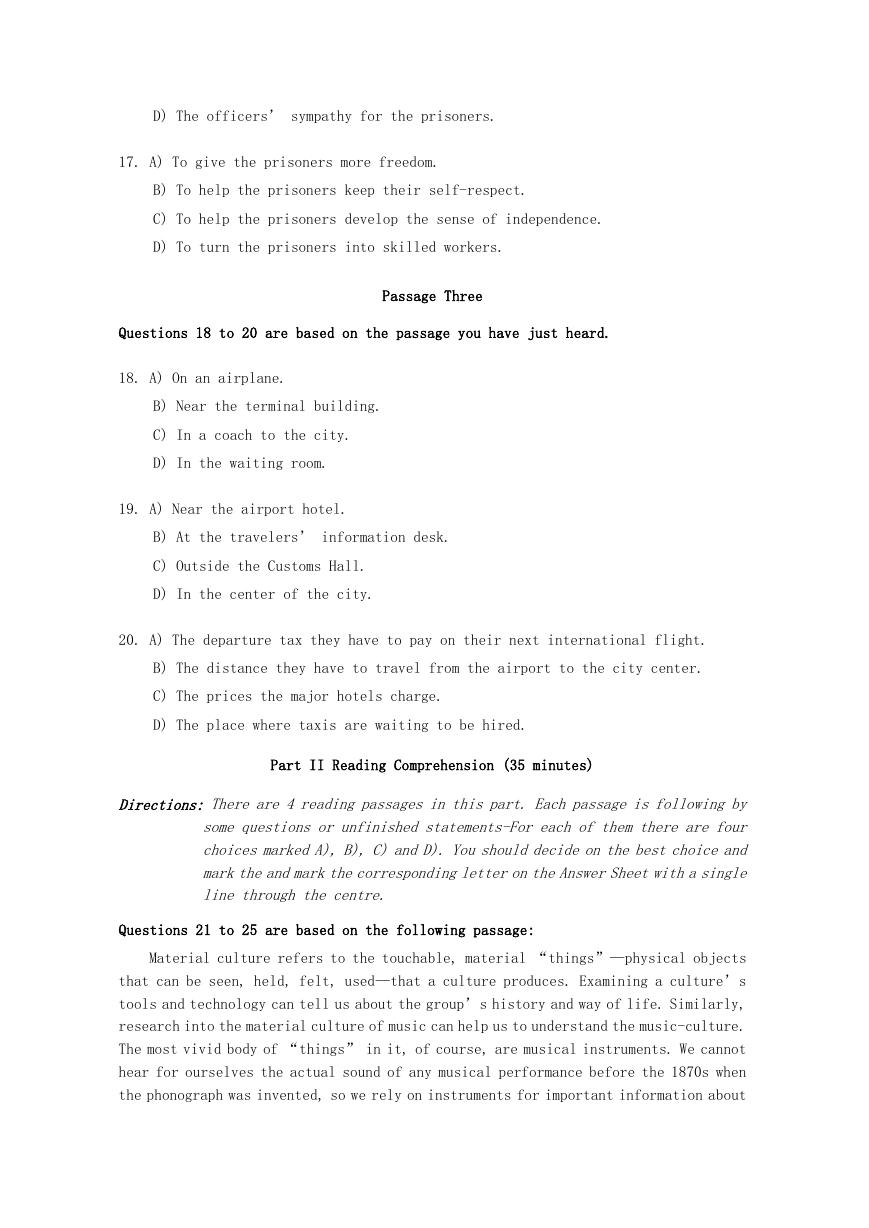
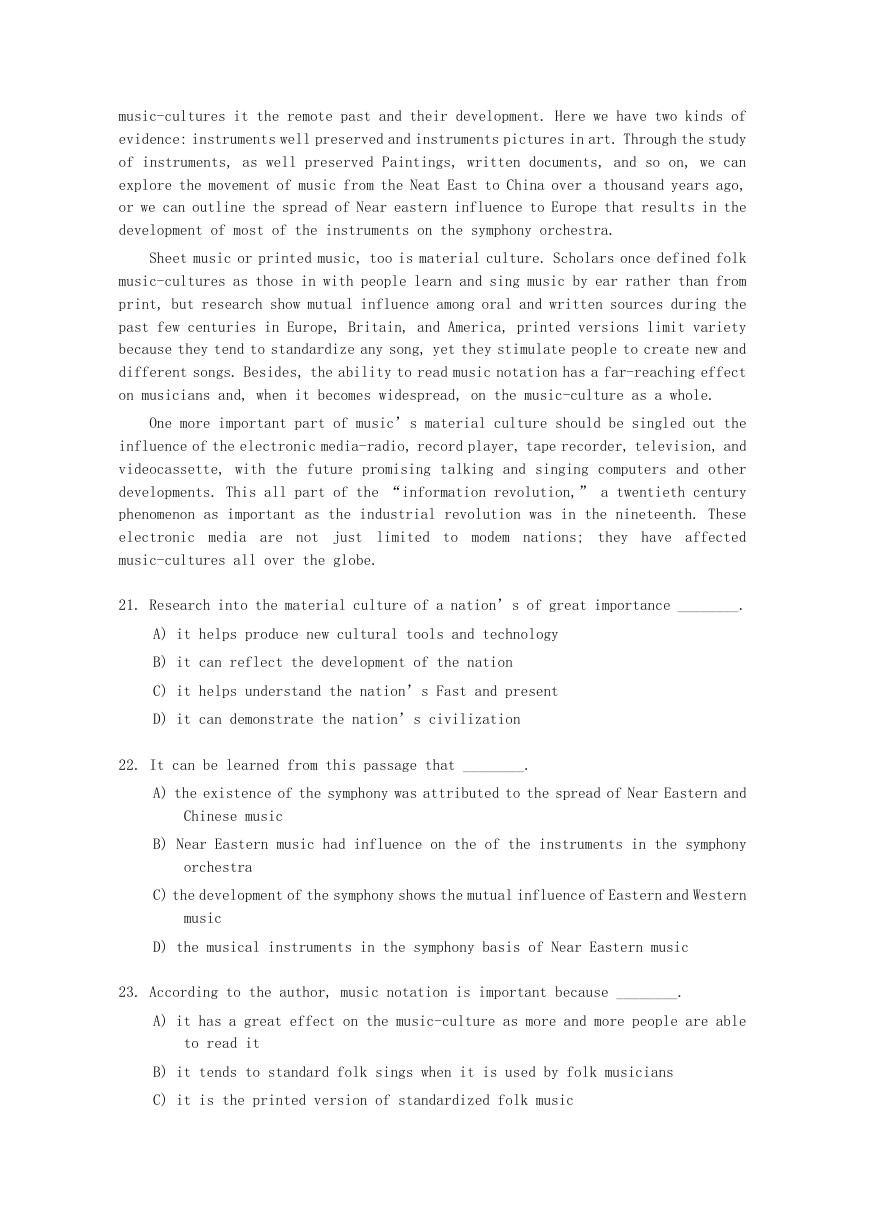
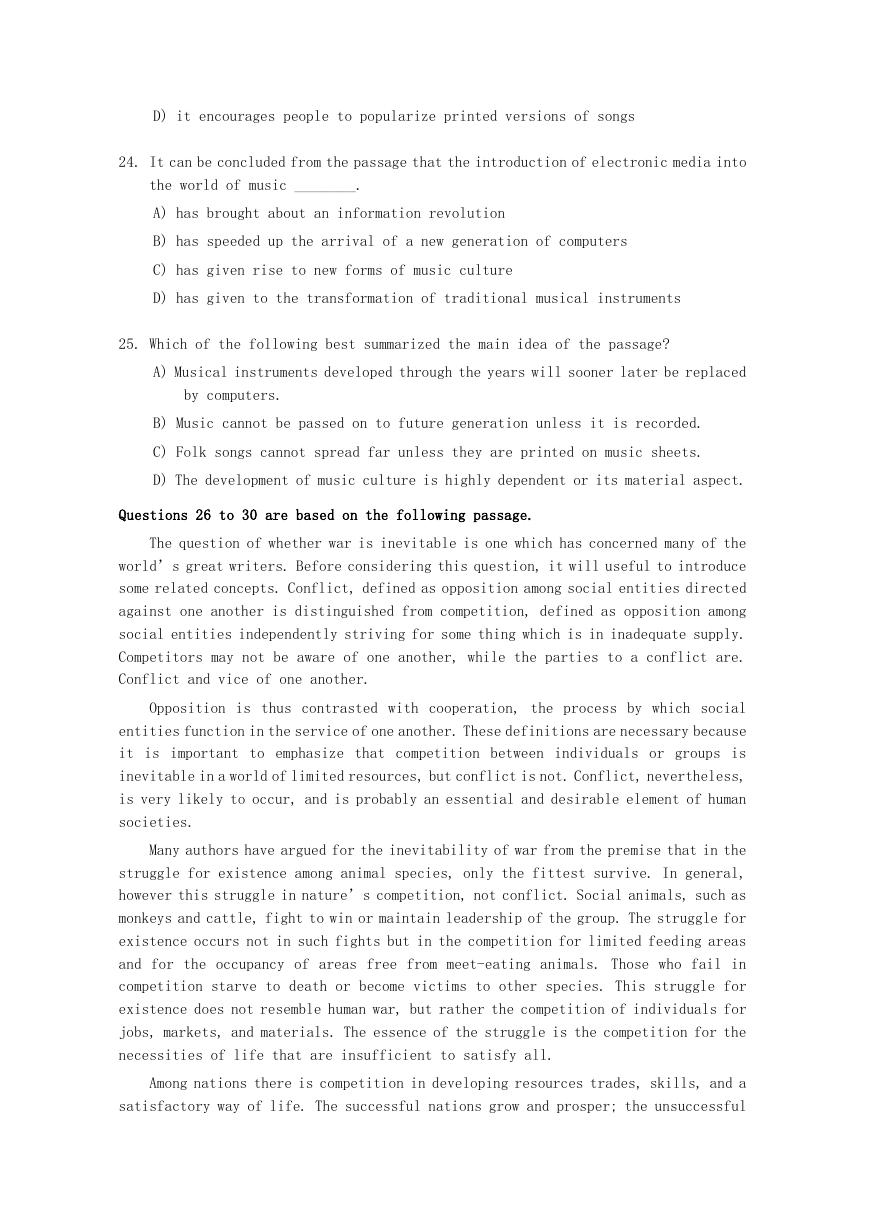
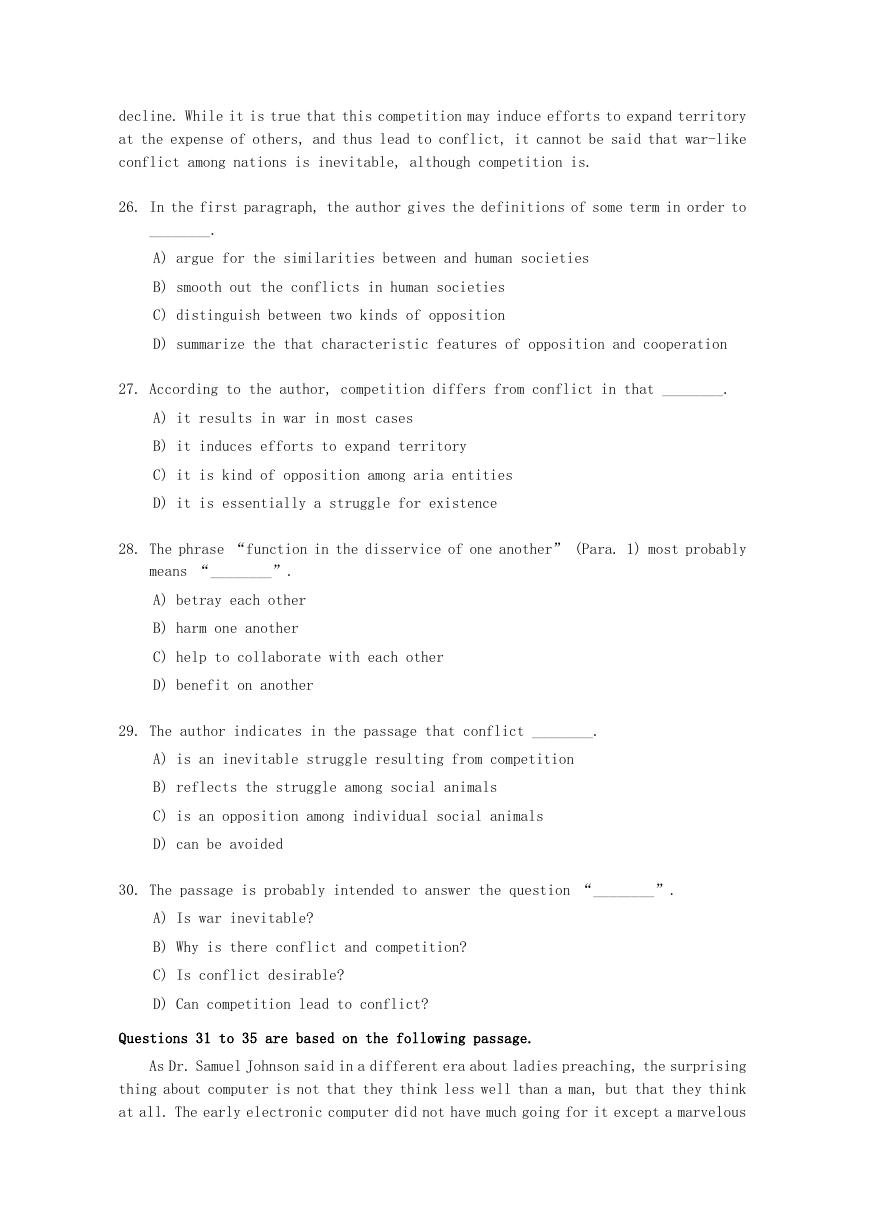
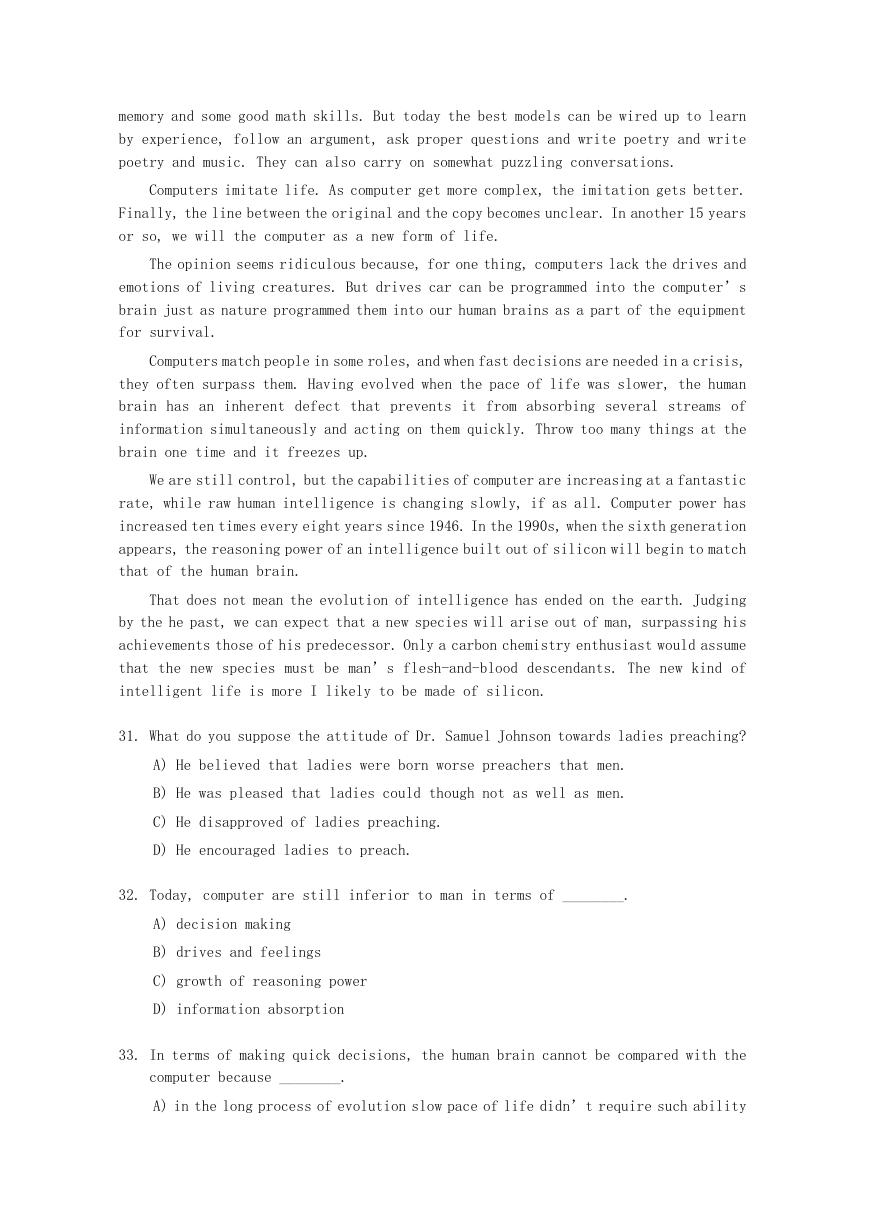








 2023年江西萍乡中考道德与法治真题及答案.doc
2023年江西萍乡中考道德与法治真题及答案.doc 2012年重庆南川中考生物真题及答案.doc
2012年重庆南川中考生物真题及答案.doc 2013年江西师范大学地理学综合及文艺理论基础考研真题.doc
2013年江西师范大学地理学综合及文艺理论基础考研真题.doc 2020年四川甘孜小升初语文真题及答案I卷.doc
2020年四川甘孜小升初语文真题及答案I卷.doc 2020年注册岩土工程师专业基础考试真题及答案.doc
2020年注册岩土工程师专业基础考试真题及答案.doc 2023-2024学年福建省厦门市九年级上学期数学月考试题及答案.doc
2023-2024学年福建省厦门市九年级上学期数学月考试题及答案.doc 2021-2022学年辽宁省沈阳市大东区九年级上学期语文期末试题及答案.doc
2021-2022学年辽宁省沈阳市大东区九年级上学期语文期末试题及答案.doc 2022-2023学年北京东城区初三第一学期物理期末试卷及答案.doc
2022-2023学年北京东城区初三第一学期物理期末试卷及答案.doc 2018上半年江西教师资格初中地理学科知识与教学能力真题及答案.doc
2018上半年江西教师资格初中地理学科知识与教学能力真题及答案.doc 2012年河北国家公务员申论考试真题及答案-省级.doc
2012年河北国家公务员申论考试真题及答案-省级.doc 2020-2021学年江苏省扬州市江都区邵樊片九年级上学期数学第一次质量检测试题及答案.doc
2020-2021学年江苏省扬州市江都区邵樊片九年级上学期数学第一次质量检测试题及答案.doc 2022下半年黑龙江教师资格证中学综合素质真题及答案.doc
2022下半年黑龙江教师资格证中学综合素质真题及答案.doc